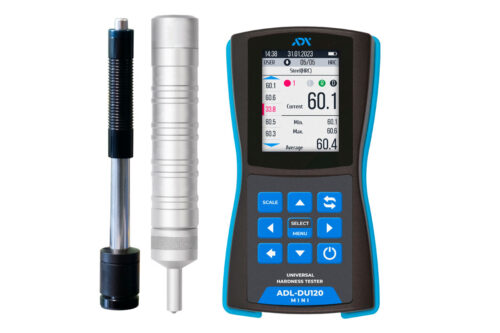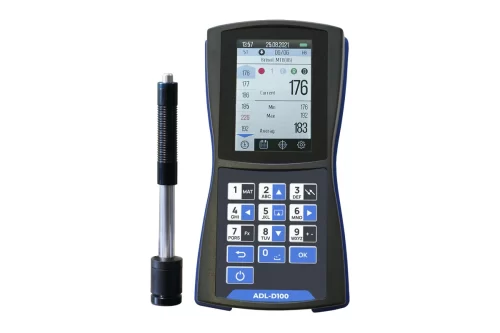Description
ADL-DU110 in Uzbekistan, Tashkent
A universal hardness tester is used to solve various problems. It is well suited for measuring carbon and structural steels, surface-hardened products, heat-resistant, corrosion-resistant, stainless steels, galvanized coatings, surfacing, complex-shaped products, thin-walled and compact products.
DYNAMIC SENSOR
To measure the hardness of solid products with poorly prepared surfaces and coarse-grained structures, it is recommended to use a dynamic probe type G.
It has low sensitivity to product curvature and surface roughness. The device can be equipped with additional replaceable sensors with different dimensions, spring stiffness and indenter stiffness.
ULTRASONIC SENSOR
Using an ultrasonic sensor, you can easily solve the problems of measuring the hardness of grooves, small-radius surfaces, hard-to-reach places, products of complex shapes and small parts.
It is well suited for measuring the hardness of mirror surfaces of shaft journals, blades, and gear teeth, since it has a small identifier imprint.
FEATURES OF THE ADL-DU110 HARDNESS TESTER:
- Dust- and moisture-proof housing.
- The intuitive interface is organized according to the “PLUG AND PLAY” principle.
- Color display with adjustable backlight clearly shows measurements in bright sunlight and low light.
- Notification is provided when a measurement result is outside the specified limits.
- Unique statistical data processing system for rapid analysis of measurement results.
- Large memory capacity – allows you to enter and save more than 500 custom scales and view the history of all measurements taken after completion of work.
- Single point calibration function.
- Independent programming of additional scales.
- Saving all measurement results by date and time.
- View results in the form of tables and graphs for a detailed analysis of the obtained values.
- Stable operation in difficult climatic conditions.
The Universal Hardness Tester ADL-DU110 is a specialized instrument used to measure the hardness of materials. Here’s some information about it:
- Universal Hardness Testing: The ADL-DU110 is designed for measuring hardness using various methods, including Brinell, Rockwell, Vickers, and Knoop hardness testing techniques. This makes it versatile and suitable for a wide range of materials and applications.
- Model Name: “ADL-DU110” denotes the model number or designation of this particular universal hardness tester.
- Testing Methods: The device supports multiple hardness testing methods, each suited for different materials and applications:
- Brinell Hardness Test: Measures the hardness of materials by pressing a hard steel or carbide ball into the surface.
- Rockwell Hardness Test: Measures the depth of penetration of an indenter under a large load (major load) compared to the penetration made by a preload (minor load).
- Vickers Hardness Test: Measures the hardness of materials by pressing a pyramidal diamond indenter into the surface.
- Knoop Hardness Test: Measures the hardness of materials using a pyramidal diamond indenter, primarily used for measuring the hardness of thin materials or small parts.
- Measurement Range: The ADL-DU110 would have a specified measurement range for each testing method, indicating the range of hardness values it can accurately measure.
- Accuracy and Precision: The specifications would include the device’s accuracy and precision in measuring hardness, typically expressed as a percentage of the measured value or in specific units corresponding to each testing method.
- Display and Controls: It would feature a display screen to show measurement readings and settings, along with controls and buttons for operation and configuration.
- Applications: Universal hardness testers like the ADL-DU110 are used in various industries such as manufacturing, metallurgy, automotive, aerospace, and quality control to assess the hardness of metals, alloys, plastics, ceramics, and other materials.
- Data Storage and Transfer: Some models may have the capability to store measurement data for later analysis or transfer it to a computer for further processing.
- Calibration: Periodic calibration is necessary to ensure the accuracy of the measurements. The ADL-DU110 would likely come with instructions for calibration or may need to be calibrated by a certified technician.
- Accessories: The universal hardness tester may come with accessories such as indenters, anvils, calibration standards, and software for data analysis and reporting.
Overall, the Universal Hardness Tester ADL-DU110 is a versatile and reliable tool for assessing the hardness of various materials using different testing methods.
Other products in category Mechanical tests




